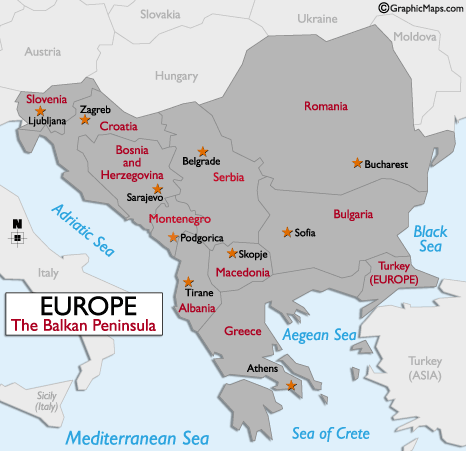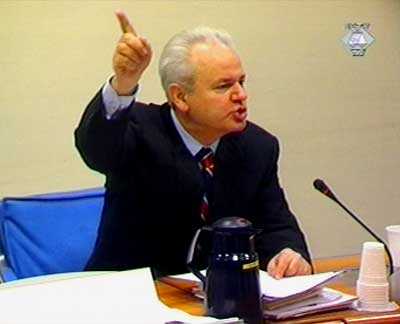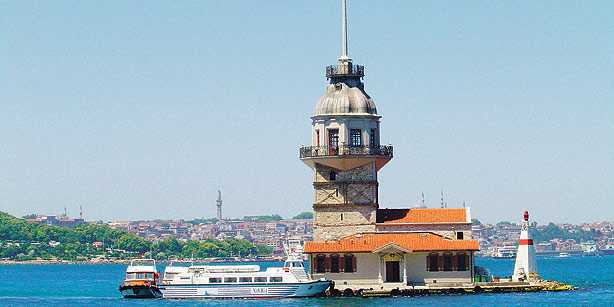SHARP-EYED observers have noted that some of the protestors that brought down Egypt’s president used the clenched-fist logo of Otpor, the well-organised, foreign-financed civic resistance movement that helped topple Slobodan Milosevic in 2000. Parts of the Serbian press, notes Florian Bieber, an academic who works on Balkan affairs, have claimed that former Otpor activists helped train some of the opposition groups.

With the world’s attention on the Arab world, the political instability gripping much of the western Balkans has largely been ignored. Yet so serious is the unrest here—including mass demonstrations in Belgrade, Tirana and Skopje—that one diplomat told me his country’s foreign ministry had asked him if he thought that Egypt-style revolution might sweep northwards into the Balkans. (His answer was an emphatic “no”.) Here is a round-up of recent developments:
Kosovo held an election on December 12th, but still has no government. Following allegations of “industrial-scale” fraud, re-runs had to be held. Until an apparent breakthrough yesterday, the country’s politicians had been unable to secure the basic outlines of a deal which would permit the formation of a government. Now, however, a faction within the Democratic Party of Kosovo of Hashim Thaci, the acting prime minister, has been forced to drop its insistence that its man, Jakup Krasniqi, the acting president, be given the job formally.
Behgjet Pacolli, a tycoon, now looks set to become president. In exchange his party, the New Kosovo Alliance, will enter into coalition with Mr Thaci. Mr Pacolli is married to a Russian, which, given Moscow’s refusal to recognise Kosovo’s independence, leaves some Kosovars appalled.
Two years after independence, Mr Thaci has never been so weak politically. He has been weakened by a row with Fatmir Limaj, the outgoing minister of transport, who enjoys much support in the party. Internationally, his standing has been shredded by a recent Council of Europe report making all sorts of lurid allegations against him. EULEX, the EU’s police mission in Kosovo, is now investigating. Partly as a consequence Kosovo’s European integration process has failed to get off the ground. Five of the EU’s 27 members do not recognise Kosovo.
The situation in Macedonia is little better. Nikola Gruevski, the prime minister, has set off for Washington seeking support for his attempts to speed EU and NATO integration, but he may get his ear chewed off when he arrives. Solving the almost 20-year-old name dispute with Greece appears less of a priority in Skopje than ever. Construction of a giant plinth that will support a statue of Alexander the Great is proceeding briskly, guaranteeing fresh outrage in Greece.
The Social Democratic opposition has pulled out of parliament, and Macedonia is gripped by the saga of A1 Television, whose bank accounts have been frozen for a second time by the courts. Mr Gruevski’s opponents say that the government is trying to muzzle the last bastion of free speech in the country. Nonsense, claim government supporters. The courts are simply clamping down on tax evasion. In fact, the two arguments do not contradict each other. The smart money is on an early election in June.
Meanwhile a small group of Albanians and Macedonians fought a pitched battle in Skopje castle on February 13th, where the government has begun building what it says is a museum, in the shape of a church. The problem is that the castle is in an Albanian, and hence Muslim, part of town. When the Albanians protested, saying that the structure was being built over an ancient Illyrian site, Pasko Kuzman, the chief archaeologist, said construction would stop. But builders went in at night to continue their work, which led the Albanians to try and dismantle the structure. And so on, and so on.
Over in Albania the prime minister, Sali Berisha, has accused the opposition of staging a coup, following a demonstration on January 21st that went horribly wrong when Republican Guards allegedly fired on opposition supporters, killing four. The demonstration sprang from charges by the opposition, led by Edi Rama, the Socialist mayor of Tirana, that Mr Berisha was returned to power in June 2009 by fraudulent elections. Unlike Macedonia, Albania is a member of NATO, but its EU integration path has effectively stalled.*
The Serbian government has been holed and is taking on water—but has not sunk yet. Mladjan Dinkic, head of the G17 Plus party and Serbia’s deputy prime minister, had been openly criticising his governmental colleagues from President Boris Tadic’s Democratic Party. On February 14th Mirko Cvetkovic, the prime minister, moved to sack him. Mr Dinkic resigned today but stopped short of pulling his party out of the government.
How long the Serbian government can limp on like this is anyone’s guess. Tomislav Nikolic, leader of the opposition Serbian Progressive Party, has said that unless new elections are called before April 5th he will lead more protests in Belgrade. Watch this space.
Last but not least, Bosnia and Hercegovina. Elections there were held on October 3rd, but there is still no government at state level. No surprise there. Progress on anything, let alone EU integration, has been stalled in Bosnia since 2006 in the wake of the failure of the so-called “April Package” of constitutional reforms. Al Jazeera recently announced plans for a Balkans channel, based in Sarajevo and broadcasting in what it delicately calls “the regional language”. Given the station’s role as the cheerleader of revolt in Tunisia and Egypt, one can understand diplomats’ concerns.
Global Agenda



